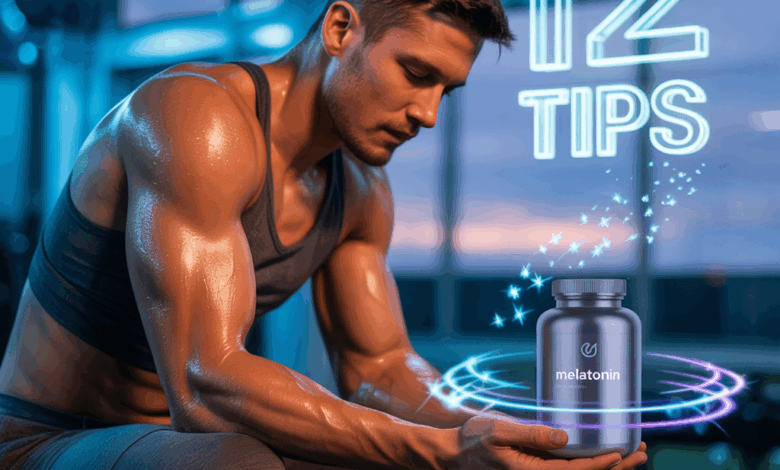Can You Take Melatonin After Pre Workout 12 Tips To Help You Sleep

Ever slammed a late-night lifting session, slammed a pre-workout, and then stared at the ceiling wondering, “Can I take melatonin after pre workout?” You’re not alone. Many gym-goers chase performance with stimulants and then scramble for ways to fall asleep when the caffeine refuses to clock out. This article breaks down safe timing, real-world strategies, and 12 practical tips to help you sleep after a stimulant-fueled workout.
Why this question matters
Pre-workout products often contain caffeine and other stimulants that can interfere with sleep. Melatonin — a hormone supplement that helps regulate circadian rhythm — is a common go-to for sleep. But mixing stimulants and sleep aids without a plan can leave you tossing and turning or taking ineffective doses.
Quick answer
Yes, you can take melatonin after pre workout in many cases, but timing and context matter. If your pre-workout contains caffeine or strong stimulants, wait for the stimulant effects to subside (usually several hours) and use melatonin at a moderate dose (0.5–3 mg) while practicing sleep hygiene. Always talk to your healthcare provider if you’re on medication or have a health condition.
How stimulants and melatonin interact
Caffeine and similar stimulants block adenosine receptors and increase alertness. Melatonin signals the brain that it’s time to sleep. They don’t chemically cancel each other out, but caffeine’s wake-promoting effects can make melatonin less effective until the stimulant level drops. Caffeine’s half-life is roughly 4–6 hours for most people — younger, older, or those on certain medications may experience different timing.
Real-world example
Imagine you take a pre-workout with 200 mg caffeine at 7 pm and finish training at 8 pm. Expect meaningful stimulant effects to linger into the early morning. Taking 3 mg of melatonin at 9 pm may be less effective than waiting until 11 pm–1 am when caffeine levels decline. Alternatively, choose a lower-caffeine pre-workout or train earlier.
12 tips to help you sleep after a pre-workout
- Time your workout earlier — Shift evening training to late afternoon when possible to reduce conflict with bedtime.
- Read labels — Know how much caffeine and yohimbine or other stimulants your pre-workout contains.
- Lower the dose — Use half a scoop or a stim-free version if you train close to bedtime.
- Wait before melatonin — If you consumed caffeine, wait at least 4–6 hours (or until stimulant effects fade) before taking melatonin.
- Use a low melatonin dose — Start with 0.5–1 mg; many sleep experts recommend low doses to mimic natural melatonin peaks. Adjust only if needed.
- Practice sleep hygiene — Cool, dark, and quiet bedroom; consistent sleep schedule; no screens 30–60 minutes before bed.
- Try relaxation techniques — Deep breathing, progressive muscle relaxation, or a short guided meditation after training can reduce arousal.
- Hydrate smartly — Drink water to recover but taper fluids 60–90 minutes before bed to avoid nighttime bathroom trips.
- Light snack with protein — A small snack like Greek yogurt or a banana with nut butter can stabilize blood sugar and promote sleepiness.
- Use magnesium or herbal aids — Magnesium glycinate or calming herbs like chamomile may help (consult your provider first).
- Swap workouts — On late evenings, do low-intensity workouts (yoga, mobility, light cardio) instead of high-intensity sessions that spike adrenaline.
- Consider stim-free pre-workouts — If you regularly train late, choose stimulant-free formulas to support performance without impacting sleep.
Workout variations to protect your sleep
If late training is unavoidable, choose modalities that won’t jack your nervous system:
- Active recovery: brisk walk, light cycling, or mobility work
- Technical skill work: focus on form, mobility drills, and lower intensity
- Evening yoga or stretching: promotes parasympathetic activation and relaxation
When to take melatonin: timing and dosing
Melatonin works best when taken 30–90 minutes before desired sleep time. For people coming off stimulants, it may be more effective to wait until the stimulant’s subjective effects have reduced. Common dosing guidance:
- 0.5–1 mg: good starting dose for many adults
- 1–3 mg: moderate dose for temporary sleep issues
- Consult doctor before higher doses or long-term use
Safety and medical considerations
Melatonin is generally safe short-term but can interact with blood thinners, immunosuppressants, diabetes medications, and birth control. Pregnant or breastfeeding people should avoid it unless a provider approves. If you experience persistent insomnia, anxiety, or daytime sleepiness, seek medical advice.
Can you take melatonin after pre workout 12 tips to help you sleep — final thoughts
Can you take melatonin after pre workout 12 tips to help you sleep? Yes — with strategy. Know your pre-workout’s stimulant content, space your melatonin dosage appropriately, and layer sleep-friendly habits like relaxation techniques, low-intensity evening sessions, and consistent sleep hygiene. These approaches reduce reliance on high melatonin doses and help you recover better both in and out of the gym.
Frequently Asked Questions
There’s no one-size-fits-all answer. Caffeine’s half-life is typically 4–6 hours; wait until you feel stimulant effects decreasing. For heavy caffeine doses, consider waiting 6–8 hours or using a lower melatonin dose and sleep hygiene practices.
Higher doses can cause morning grogginess in some people. Starting with a low dose (0.5–1 mg) and using it intermittently reduces this risk. If you consistently feel groggy, stop use and consult a healthcare professional.
Yes. Many stimulant-free formulas include creatine, beta-alanine, citrulline, and electrolytes to support performance and focus without impacting sleep. They’re especially useful for evening trainers.
Conclusion — take control of your sleep and recovery
If you’ve ever wondered, “can you take melatonin after pre workout 12 tips to help you sleep,” now you have a plan. Adjust your timing, choose appropriate doses, and apply the 12 tips above to protect your rest and training gains. Start by trying one change this week — like switching to a stim-free pre-workout or moving your session earlier — and see how your sleep improves.
Ready to optimize both your workouts and sleep? Check our workout routines for evening-friendly sessions and browse our nutrition guides or wellness tips to build a recovery-friendly routine. Share your experience in the comments below — what helped you fall asleep after a late workout?





